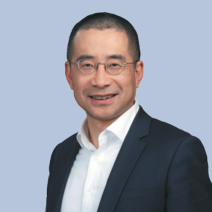MNC execs eye business expansion in China

Editor's Note: This year marks a critical milestone as China concludes its 14th Five-Year Plan. To help in assessing the success of the process, we have asked multinational executives to share with our readers their insights about their business achievements in the past few years and further expectations in the years to come.
Q1 What are your expectations for the two sessions? Do you expect any specific policy measures for further deepening reforms and expanding high-level opening-up? What more should China do to create a more enabling business environment for foreign investors?
MA: China is one of Nissan's core markets and we are proud to have contributed to the growth of its automotive sector for over five decades.
China's recent steps to optimize the business environment, exemplified by the "2025 Action Plan for Stabilizing Foreign Investment", further strengthened our confidence in deepening our presence in China. We are closely following the two sessions, anticipating supportive policies on new energy vehicles and intelligent mobility. These areas, where China excels and Nissan invests heavily, are vital for a sustainable automotive future.
Leveraging global expertise in electrification and autonomous driving, along with local partnerships, we aim to create innovative products, strengthen our local supply chain and create value for the Chinese automotive industry.
YIN: In recent years, China has been steadfast in developing "new quality productive forces" and accelerating high-quality development, which not only prompts various industries to accelerate their transformation toward digitalization and decarbonization, but also creates broader development space for Schneider Electric. At the same time, China's continued efforts to expand high-level opening-up and optimize the environment for foreign investment, as evidenced by the recent release of the "2025 Action Plan for Stabilizing Foreign Investment", have further bolstered our confidence in our development in China. Having operated in the Chinese mainland for 38 years, Schneider Electric has been comprehensively strengthening its capabilities and ecosystem under the unwavering "China Hub" strategy, which integrates all forces from R&D to production and sales.
AN: Over the past 50 years, Henkel has witnessed and actively participated in China's economic growth, benefiting from the country's ongoing opening-up and continuous improvements in the business environment.
In February, the "2025 Action Plan for Stabilizing Foreign Investment" proposed initiatives to advance a higher-level open economic system and further support foreign enterprises in investing and expanding their presence in China. This has strengthened our confidence in deepening our presence and increasing our investments in the Chinese market.
We believe the trend toward high-level opening-up will continue in the coming years. We also appreciate new initiatives that drive innovation and further enhance the business environment, fostering an improved market system that supports sustainable growth.
CHEN: The two sessions provide China with an opportunity to introduce policy measures that further deepen reforms and expand high-level opening-up. Notably, the State Council recently released its"2025 Action Plan for Stabilizing Foreign Investment", which affirmed the government's commitment to higher-standard opening-up and continuous business environment improvements, encouraging both Chinese enterprises and multinational corporations like Unilever. With a century-long presence in China, Unilever has witnessed significant progress in the optimization of China's business environment and remains confident in the market. Looking ahead, we believe China's resilient and dynamic market will inject greater vitality into the fast-moving consumer goods sector, creating new opportunities for growth.
Q2 "New quality productive forces "is widely seen as key to helping China achieve industrial upgrade and "high-quality development". How can your company help cultivate such forces in China?
MA: China is heavily investing in what it dubs "new quality productive forces", with an emphasis on the automotive sector. In particular, we are seeing the integration of new energy and intelligent vehicles emerging as an area of special priority, backed by supportive government policies.
Nissan has accumulated extensive practical experience in cultivating new quality productive forces and we have made electrification and vehicle intelligence a strategic focus, accelerating product innovation through our own technological advancements while strengthening the cooperation with ecosystem partners.
It goes beyond just one individual innovation in technology or products. In China, Nissan has established a full-value-chain business layout, covering cutting-edge technology R&D, vehicle design, manufacturing, sales and services, mobility services (such as Robotaxi), and parts export, etc.
YIN: For Schneider Electric, the concept of new quality productivity forces underscores the development of "digital productivity" and "green productivity". It calls on all industries to expedite technological innovation and application, driving the "dual transformation" toward digitalization and decarbonization. Technological innovation stands as the primary driver of new quality productive forces. To this end, Schneider Electric continues to strengthen its innovation capabilities. Under the "China Hub" strategy, we have been constantly increasing our R&D investment in China with a series of world-class R&D institutions established in recent years to provide innovative technical support for industrial upgrading and energy transition.
AN: China's high-quality development and new quality productive forces have further shaped the country's development blueprint, strengthening our confidence in its long-term growth.
In 2024, Henkel increased investments to capitalize on these opportunities. Our Asia R&D Center for Henkel Consumer Brands, valued at 100 million yuan ($13.7 million), opened in Shanghai and is designed to drive local product innovation in the consumer goods sector. In the industrial sector, Henkel's 900 million yuan "Kunpeng" plant is progressing and is expected to begin test production in March, enhancing our ability to supply high-end adhesives for industries such as electronics and automotive. Additionally, we are set to launch our new Inspiration Center for Adhesive Technologies this year, further boosting our innovation capabilities for industrial businesses across China and the broader Asia-Pacific region.
CHEN: Unilever fully supports China's drive to cultivate new quality productive forces, recognizing that innovation is key to industrial upgrades and high-quality development. By leveraging ongoing digital transformation, we enhance operational efficiency across our eight production bases and logistics centers in China — three of which have been recognized by the World Economic Forum's Global Lighthouse Network for leadership in smart and sustainable manufacturing.
In parallel, Unilever was among the first multinational companies to establish a global R&D center in China, launching its sixth global R&D center in Shanghai in 2009. Moving forward, we will continue strengthening our local R&D capabilities, driving further innovation and delivering high-quality products tailored to Chinese consumers.
Q3 DeepSeek has been a buzzword and surprised the world starting this year. AI technology has been deeply integrated with various industries around the world. What opportunities do you foresee for your business from AI technology? What's your view on China's ability to sustain innovation in breakthrough technologies in the coming years?
MA: AI technology has a wide range of applications in the automotive industry and vehicle intelligence has always been a key focus of Nissan's strategy.
Nissan has been deeply connected with China for over 50 years and has witnessed and participated in the development of China's automotive industry. In the past, we introduced technologies and products from our global portfolio to the China market. Now, we are shifting toward making technological innovation that begins in China. Our joint venture partner, Dongfeng Nissan, has embraced "China speed" by becoming one of the earliest automakers to integrate AI technology into a real-world vehicle.
Moving forward, we hope that more technological achievements will benefit not only the China market, but also markets worldwide.
YIN: As a leading digital technology, AI is reshaping the industrial landscape. AI will accelerate industrial transformation, not only improving efficiency, but also promoting sustainable development, and will provide a powerful tool for building new quality productive forces.
At Schneider Electric, we believe that AI technology must be deeply integrated with industry scenarios to form professional solutions and create value across various sectors. On the one hand, we are actively exploring the deep integration of AI technology with industry scenarios, actively deploying AI technology in our own production and operations, improving operational efficiency, and promoting sustainable development. On the other hand, Schneider Electric actively empowers upstream and downstream partners with AI technologies and application experience to jointly enhance the AI application capabilities of the industrial chain.
AN: China has firmly established itself as one of the global leaders in cutting-edge technologies, including artificial intelligence. The rapid advancements in AI demonstrate the country's strong commitment to innovation and digital transformation. Looking ahead, China's strong commitment to driving innovation and technological progress will continue to create new opportunities in the coming years. At Henkel, we are confident in the market's potential and remain dedicated to working alongside our customers to drive technological advancements and industry growth. Through close collaboration and continuous investment, we aim to contribute to the sustainable and high-quality development of AI-driven industries.
CHEN: China's AI-driven advancements are transforming industries, injecting momentum into the fast-moving consumer goods sector, and creating new opportunities for growth and efficiency. At Unilever, harnessing AI-driven digital tools to enhance operational efficiency and accelerate business growth is a key pillar of our business strategy under the "Accelerate" framework. For example, we recently pioneered the FTC (Factory-to-Consumer) digital logistics model, optimizing supply chain efficiency and responsiveness to enhance the consumer shopping experience. Additionally, we are ramping up our digital investment in social media, ensuring greater agility and engagement across both established and high-growth platforms.
Q4 Driving domestic consumption is one of the top priorities for China to spur economic growth this year. How do you see China's potential to drive a consumption-led impetus for the economy? How will that affect your company's profitability this year?
MA: We believe the fundamentals of China's long-term economic growth remain unchanged, with its vast market size, continuously upgrading consumer demand and improving industrial ecosystem providing broad development opportunities for foreign enterprises.
As an automaker, "driving innovation to enrich people's lives" is our corporate purpose, with the aim of enhancing our innovation capabilities to provide our customers with more exciting products and experiences. This is why we launched our updated brand proposition "Excitement by NI" in China last year to constantly pay close attention to Chinese consumer needs.
We hope that the products we develop for Chinese consumers will be well received and appreciated, contributing to stronger business growth.
YIN: Under the requirements of high-quality development, the demand for green and intelligent products from Chinese users has surged, driving various industries to transform and upgrade. In response, Schneider Electric leverages its advanced technology and extensive experience to empower industries with the "dual transformation" of digitalization and decarbonization, propelling them toward high-end development. For example, in sectors such as food and beverage, chemical, biomedical and electronic, our comprehensive digital solutions and services, which cover the entire lifecycle of products and assets, are helping enterprises enhance efficiency, save energy, and improve the traceability, intelligence and safety of their products.
AN: China is an important market for Henkel. With stimulating domestic demand set as a top priority for 2025 at the Central Economic Work Conference held in Beijing last December, we remain confident in the long-term growth of China's consumer goods sector.
By deepening our investments — including the 2024 acquisition of the Vidal Sassoon brand in Greater China and the launch of our Asia R&D Center in Shanghai with 100 million yuan of investment — we aim to better serve Chinese consumers with localized innovations tailored to their preferences.
Looking ahead, we will continue to invest in China to meet the evolving needs of this dynamic market.
CHEN: The Chinese market offers enormous opportunities to businesses in various sectors. China's evolving consumer preferences continue to drive growth. In the first three quarters of 2024, China's FMCG market achieved a stable increase of 0.8 percent amid economic uncertainties.
If we look into the beauty segment, China is the world's second-largest high-end beauty market and the largest high-end skincare market. It is also the second-largest global market for hair care products, with the premium segment growing at an impressive 12 percent annually.
Seeing the great potential of these sectors, Unilever remains confident of opportunities emerging in the FMCG industry, also supported by proactive government policies and China's rapidly evolving digital channels. China's fast-growing e-commerce and specialized retail chains present an opportunity for Unilever to adapt and optimize our strategy of "social-first demand creation" — leveraging innovation and channel upgrades to meet evolving consumer needs and enhance our market presence.
Q5 As China continues to pursue high-quality development along a Chinese path to modernization, what opportunities do you anticipate for your business as this process gains more traction? Will you increase investment in China in the coming years? How will you further expand your footprint in China?
MA: Upholding our "In China, For China" philosophy, Nissan remains firmly committed to the China market. We are increasing investment and developing partnerships with local collaborators.
Through our robust partnership with Dongfeng Motor over the past 22 years, we have consistently upheld our commitment to quality, performance, technical capabilities and customer service to meet the diverse needs of Chinese customers. Since 2023, we have emphasized leveraging "China assets, China speed and China standards" to accelerate the shift toward electrification and smart technologies. In 2024, Dongfeng Nissan announced plans to invest over 10 billion yuan in NEV R&D across a three-year period, and expand the technical center to 4,000 employees.
We continue integrating our global resources to accelerate the transition to electrification and intelligence, while offering a balanced product lineup to meet the diverse needs of Chinese consumers.
YIN: China's vast market, robust industrial foundation and abundant innovation resources endow the country with tremendous development potential. Meanwhile, China is continuously expanding its openness, optimizing its business environment and increasing its support for foreign investment. All these factors are empowering us to further develop in China.
The new quality productive forces provide stronger impetus for China's industrial transformation and upgrading. Whether in green energy transformation, new industrialization, or the development of industrial services, the digitalization and green requirements raised by the new quality productive forces offer a broader development space for Schneider Electric.
AN: We recognize China's strong commitment to high-quality development and Henkel has greatly benefited from the rapid growth of key sectors such as automotive, consumer goods and electronics. As a result, we have continuously strengthened our presence in China, increasing investments in innovation, production and supply chain capabilities to enhance our end-to-end operations across both consumer and industrial businesses. In the years ahead, we will further advance our efforts in innovation and sustainability, deepen collaboration with local partners and explore cutting-edge solutions to meet evolving market demands, contributing to long-term, high-quality growth.
CHEN: As China advances high-quality development and modernization, Unilever sees vast opportunities to deepen our commitment. Currently serving nearly 80 percent of urban households, we will further expand our footprint by leveraging China's robust R&D ecosystem to drive innovation and offer high-quality products that enrich daily life.
We will continue advancing digital transformation, green low-carbon innovation and sustainable growth, while refining our portfolio to address evolving consumer demands. Guided by our strategy, we invest in social channels and introduce new offerings backed by science and technology to meet local market needs.
Moving forward, Unilever remains committed to investing, innovating and collaborating with consumers, partners and stakeholders to contribute to China's dynamic and sustainable future.

























